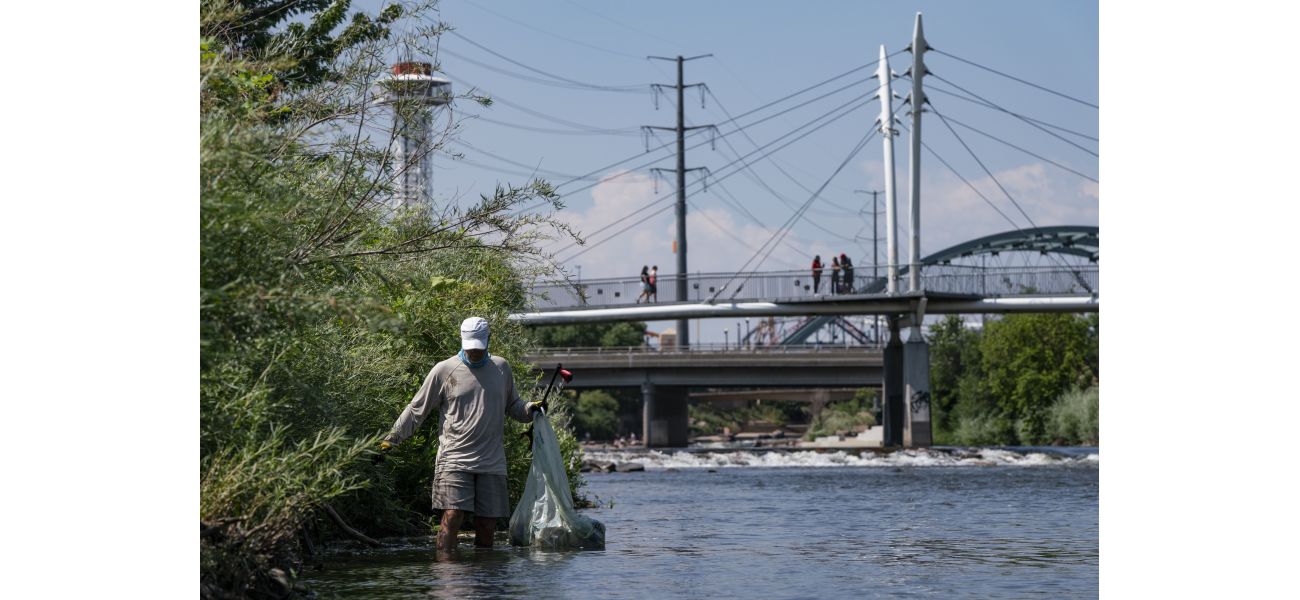The cleanliness of Denver's South Platte River remains a challenge due to various reasons, making it unsafe for swimming.
Denver's focus on the South Platte River has brought attention to ongoing environmental issues in the water.
September 8th 2024.

As volunteers make their way along the South Platte River in Denver, they come across a wide range of discarded objects scattered along its banks. From shopping carts and food wrappers to even old car phones from the '90s, the river seems to have become a dumping ground for all sorts of items. Despite efforts to revitalize the river and develop its surroundings, the water quality still falls below state standards in some areas. In fact, parts of the South Platte still have a foul odor. Despite former Mayor Michael Hancock's promise to make the river swimmable, city health officials continue to advise against swimming in the water, especially in the summer months.
According to Jon Novick, the water quality program administrator for the Denver Department of Public Health and Environment, the South Platte is not a safe place to swim. He suggests opting for a swimming pool instead, as it is a much safer option. With the recent increase in attention on the South Platte from developers, community leaders, and city officials, the many environmental challenges that still exist have been brought to light. These challenges include wastewater plants discharging effluent into the river and companies like Suncor Energy releasing various substances into the South Platte and its tributaries, such as inorganic nitrogen, arsenic, and PFAS compounds.
For decades, Denver's health department has been monitoring the river's conditions and tracking a wide range of contaminants. This includes keeping an eye on water temperature, acidity levels, nutrient levels, and the presence of metals. However, the department's biggest concern is the presence of E. coli bacteria, which can cause infections and make people sick if ingested. Novick explains that the bacteria can enter the water through animal or human waste, and the city's aging infrastructure can sometimes lead to sewage leaking into the river. Additionally, all of Denver's stormwater eventually makes its way to the South Platte, which further contributes to the spread of E. coli. The bacteria tends to thrive in warmer waters, which is why its concentration increases downstream, especially during the summer months.
In its most recent water quality report, published in October, the DDPHE ranked the South Platte's water quality as "fair," which is above "marginal" and "poor," but still below "good." In 2022, E. coli levels exceeded the standard set by the Colorado Water Quality Control Commission year-round. The river also exceeded standards for arsenic, which is naturally occurring in the bedrock beneath the city. A photo of a woman named Victoria Britto enjoying the cool waters of the South Platte at Confluence Park in the summer of 2024 is included in the original text.
The South Platte also faces challenges due to the waste produced by the millions of people who live nearby. Anything that is not picked up or blown away from Denver's streets and sidewalks eventually ends up in the river. This includes trash, lawn fertilizers, runoff from roads, pet waste, and oil and grease from vehicles. The Mile High Flood District is working to help local governments improve their stormwater cleaning methods before it reaches the river. The district, which was established after the devastating 1965 flood, has noticed some positive trends in the river's health, such as a decline in nutrients like phosphorus and nitrogen. These nutrients can cause algae blooms and harm aquatic ecosystems.
However, Holly Piza, the district's research and development director, explains that other water quality issues are getting worse, including salinity, which can damage infrastructure and harm aquatic life. To combat these problems, the city has installed bioretention ponds outside the Carla Madison Recreation Center on Colfax Avenue. These ponds help to retain water and filter it through the soil, rather than allowing it to flow directly into the river. Novick and Piza urge Denver residents to be more mindful of their actions, such as avoiding fertilizers with phosphorus or nitrogen, not littering, washing cars at car washes, and making sure sprinklers are not watering pavement.
Novick acknowledges that the city is taking steps to improve water quality, but they cannot be everywhere and do everything. He encourages residents to stay informed and get involved in efforts to protect the South Platte. Individuals can also sign up for the Mile High Roundup email newsletter to receive more news about Colorado.
According to Jon Novick, the water quality program administrator for the Denver Department of Public Health and Environment, the South Platte is not a safe place to swim. He suggests opting for a swimming pool instead, as it is a much safer option. With the recent increase in attention on the South Platte from developers, community leaders, and city officials, the many environmental challenges that still exist have been brought to light. These challenges include wastewater plants discharging effluent into the river and companies like Suncor Energy releasing various substances into the South Platte and its tributaries, such as inorganic nitrogen, arsenic, and PFAS compounds.
For decades, Denver's health department has been monitoring the river's conditions and tracking a wide range of contaminants. This includes keeping an eye on water temperature, acidity levels, nutrient levels, and the presence of metals. However, the department's biggest concern is the presence of E. coli bacteria, which can cause infections and make people sick if ingested. Novick explains that the bacteria can enter the water through animal or human waste, and the city's aging infrastructure can sometimes lead to sewage leaking into the river. Additionally, all of Denver's stormwater eventually makes its way to the South Platte, which further contributes to the spread of E. coli. The bacteria tends to thrive in warmer waters, which is why its concentration increases downstream, especially during the summer months.
In its most recent water quality report, published in October, the DDPHE ranked the South Platte's water quality as "fair," which is above "marginal" and "poor," but still below "good." In 2022, E. coli levels exceeded the standard set by the Colorado Water Quality Control Commission year-round. The river also exceeded standards for arsenic, which is naturally occurring in the bedrock beneath the city. A photo of a woman named Victoria Britto enjoying the cool waters of the South Platte at Confluence Park in the summer of 2024 is included in the original text.
The South Platte also faces challenges due to the waste produced by the millions of people who live nearby. Anything that is not picked up or blown away from Denver's streets and sidewalks eventually ends up in the river. This includes trash, lawn fertilizers, runoff from roads, pet waste, and oil and grease from vehicles. The Mile High Flood District is working to help local governments improve their stormwater cleaning methods before it reaches the river. The district, which was established after the devastating 1965 flood, has noticed some positive trends in the river's health, such as a decline in nutrients like phosphorus and nitrogen. These nutrients can cause algae blooms and harm aquatic ecosystems.
However, Holly Piza, the district's research and development director, explains that other water quality issues are getting worse, including salinity, which can damage infrastructure and harm aquatic life. To combat these problems, the city has installed bioretention ponds outside the Carla Madison Recreation Center on Colfax Avenue. These ponds help to retain water and filter it through the soil, rather than allowing it to flow directly into the river. Novick and Piza urge Denver residents to be more mindful of their actions, such as avoiding fertilizers with phosphorus or nitrogen, not littering, washing cars at car washes, and making sure sprinklers are not watering pavement.
Novick acknowledges that the city is taking steps to improve water quality, but they cannot be everywhere and do everything. He encourages residents to stay informed and get involved in efforts to protect the South Platte. Individuals can also sign up for the Mile High Roundup email newsletter to receive more news about Colorado.
[This article has been trending online recently and has been generated with AI. Your feed is customized.]
[Generative AI is experimental.]
0
0
Submit Comment





